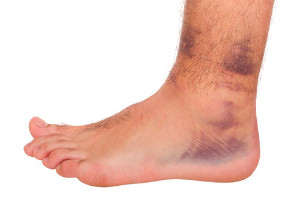Ankle Sprains and Their Symptoms
Monday, 17 February 2020 00:00 The ankle has the ability to move the foot in two directions that consist of moving away from the body, and toward the body. The bony portions on the side of the ankle are referred to as the malleoli, and these provide stability while walking and standing. If an injury occurs to the ankle, it may be difficult to walk, in addition to generally causing severe pain and discomfort. Ankle sprains are known to be the most common type of ankle injury. This can happen when suddenly stepping off of a curb, or if it is twisted in a sporting activity. Common symptoms that are associated with this type of injury can include immediate swelling surrounding the affected area, bruising, and it may feel warm. After a proper diagnosis is performed which typically consists of having an X-ray taken, treatment can begin. If you have sprained your ankle, it is strongly advised that you speak to a podiatrist who can offer correct treatment options for you.
The ankle has the ability to move the foot in two directions that consist of moving away from the body, and toward the body. The bony portions on the side of the ankle are referred to as the malleoli, and these provide stability while walking and standing. If an injury occurs to the ankle, it may be difficult to walk, in addition to generally causing severe pain and discomfort. Ankle sprains are known to be the most common type of ankle injury. This can happen when suddenly stepping off of a curb, or if it is twisted in a sporting activity. Common symptoms that are associated with this type of injury can include immediate swelling surrounding the affected area, bruising, and it may feel warm. After a proper diagnosis is performed which typically consists of having an X-ray taken, treatment can begin. If you have sprained your ankle, it is strongly advised that you speak to a podiatrist who can offer correct treatment options for you.
Ankle pain can be caused by a number of problems and may be potentially serious. If you have ankle pain, consult with Dr. Robert Graser from Graser Podiatry and Bunion Surgery Institute. Our doctor will assess your condition and provide you with quality foot and ankle treatment.
Ankle pain is any condition that causes pain in the ankle. Due to the fact that the ankle consists of tendons, muscles, bones, and ligaments, ankle pain can come from a number of different conditions.
Causes
The most common causes of ankle pain include:
- Types of arthritis (rheumatoid, osteoarthritis, and gout)
- Ankle sprains
- Broken ankles
- Achilles tendinitis
- Achilles tendon rupture
- Stress fractures
- Bursitis
- Tarsal tunnel syndrome
- Plantar fasciitis
Symptoms
Symptoms of ankle injury vary based upon the condition. Pain may include general pain and discomfort, swelling, aching, redness, bruising, burning or stabbing sensations, and/or loss of sensation.
Diagnosis
Due to the wide variety of potential causes of ankle pain, podiatrists will utilize a number of different methods to properly diagnose ankle pain. This can include asking for personal and family medical histories and of any recent injuries. Further diagnosis may include sensation tests, a physical examination, and potentially x-rays or other imaging tests.
Treatment
Just as the range of causes varies widely, so do treatments. Some more common treatments are rest, ice packs, keeping pressure off the foot, orthotics and braces, medication for inflammation and pain, and surgery.
If you have any questions, please feel free to contact our office located in Boerne, . We offer the newest diagnostic and treatment technologies for all your foot care needs.
Blog Archives
- July 2024
- June 2024
- May 2024
- April 2024
- March 2024
- February 2024
- January 2024
- December 2023
- November 2023
- October 2023
- September 2023
- August 2023
- July 2023
- June 2023
- May 2023
- April 2023
- March 2023
- February 2023
- January 2023
- December 2022
- November 2022
- October 2022
- September 2022
- August 2022
- July 2022
- June 2022
- May 2022
- April 2022
- March 2022
- February 2022
- January 2022
- December 2021
- November 2021
- October 2021
- September 2021
- August 2021
- July 2021
- June 2021
- May 2021
- April 2021
- March 2021
- February 2021
- January 2021
- December 2020
- November 2020
- October 2020
- September 2020
- August 2020
- July 2020
- June 2020
- May 2020
- April 2020
- March 2020
- February 2020
- January 2020
- December 2019
- November 2019
- October 2019
- September 2019
- August 2019
- July 2019
- June 2019
- May 2019
- April 2019
- March 2019
- February 2019
- January 2019
- December 2018
- November 2018
- October 2018
- September 2018
- August 2018
- July 2018
- June 2018
- May 2018








